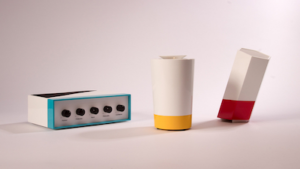Loraine Clarke

Loraine Clarke
Lecturer - School of Computer Science
Email: lec24@st-andrews.ac.uk
Projects
Decentralising Digital
Decentralising Digital is a 2 year research project involving design researchers from universities across the UK, Quicksand – a design research studio with offices across India, the National Institute of Design, India and a range of community partners including Black Baza Coffee Collective, Buffalo Back Farming Collective and Janastu.
Through the project, we wanted to co-create new narratives that explore how powerful developments in emerging technologies such as the Internet of Things, the voice enabled Internet, machine learning and artificial intelligence might be harnessed to support rural communities in India. Often, these technologies are products of companies far removed from India and the asymmetric relationship between the makers of such technologies and the people that use them is sometimes referred to as Digital Colonialism.
We wanted to challenge existing narratives, telling new stories that reflect the diverse hopes that people and communities from rural areas have for their futures and the roles that emerging technologies might play in supporting and delivering these. These new narratives point to Hopeful Futures. This research uses creative technology and design fiction to explore hopeful futures with farmers and tribal people residing in the Indian region of Karnataka. Farmers and tribal forest people are two groups that are experiencing the most damage from climate change, large-scale agricultural technologies and the politics of an unequal world. In response to this, we co-created a set of creative technology derived narratives and fictional artefacts that represent multiple futures for how emerging digital technologies could support such communities.
A series of interactive prototypes using electronics and digital fabrication were created to explore future narratives with communities. The final futures speculated with the communities were presented in the form of three stories in illustrated comics. 12 artefacts representing future technologies the communities hope for were designed and presented in the comics.
To read more about the project and download the comics see: https://www.decentralising.digital/
Our Friends Electric

Emerging technologies-such as the voice enabled internet-present many opportunities and challenges for HCI research and society as a whole. Advocating for better, healthier implementations of these technologies will require us to communicate abstract values, such as trust, to an audience that ranges from the general public to technologists and even policymakers. In this research, we show how a combination of film-making and product design can help to illustrate these abstract values. Working as part of a wider international advocacy campaign, Our Friends Electric focuses on the voice enabled internet, translating abstract notions of Internet Health into comprehensible digital futures for the relationship between our voice and the internet. We conclude with a call for designers of physical things to be more involved with the development of trust, privacy and security in this powerful emerging technological landscape. This work was in collaboration with Superflux and was funded by the Mozilla Foundation.

